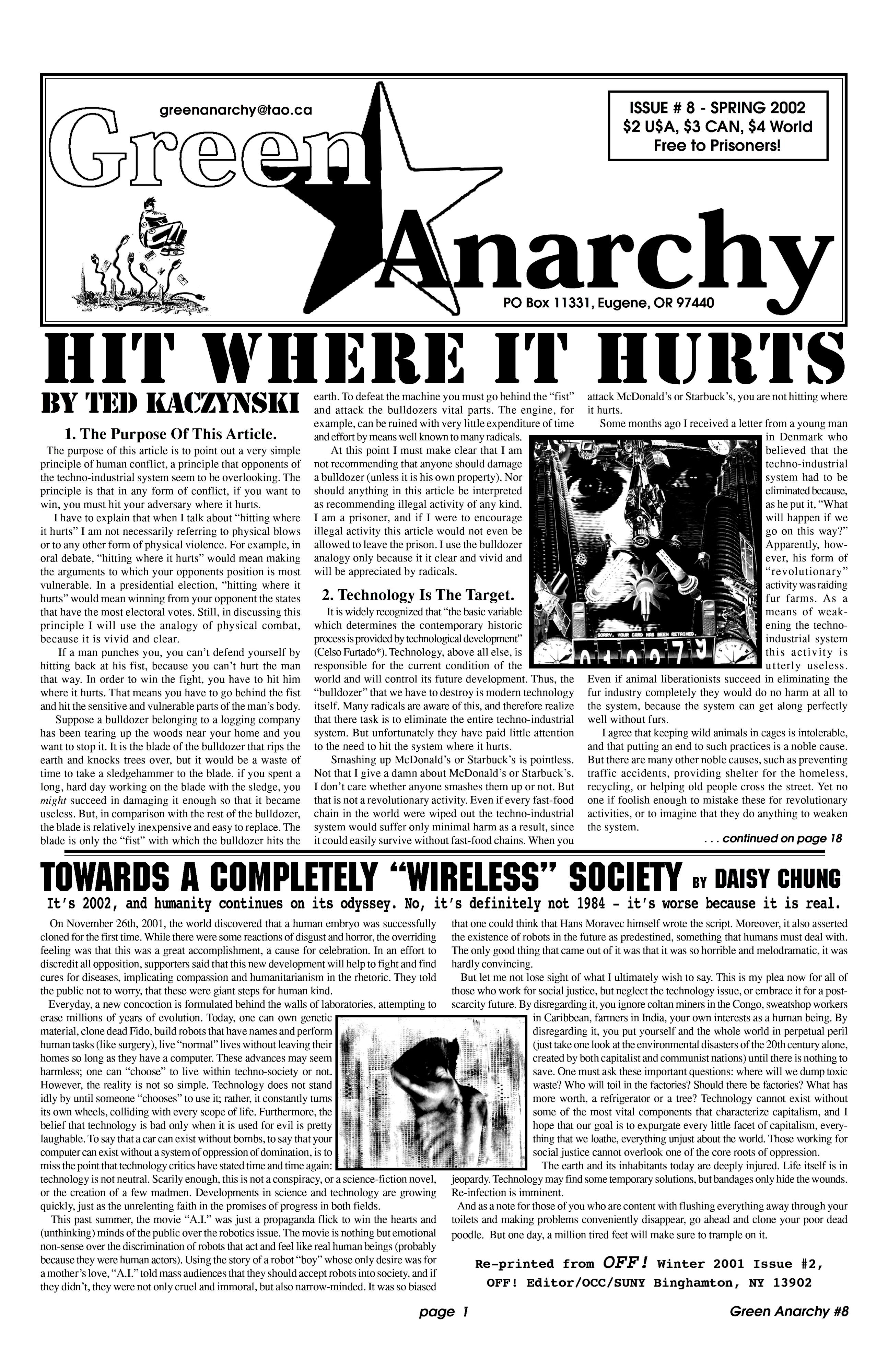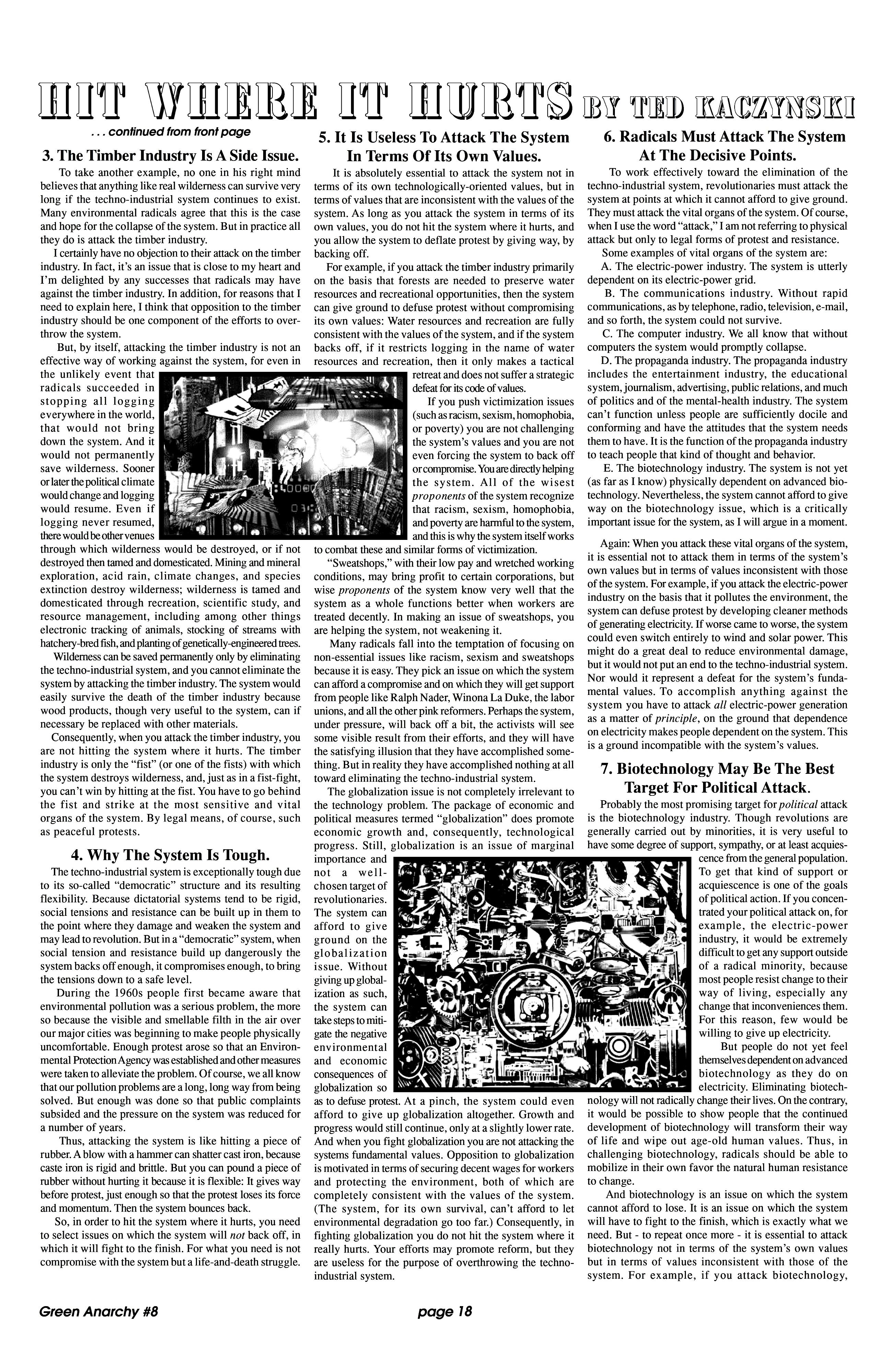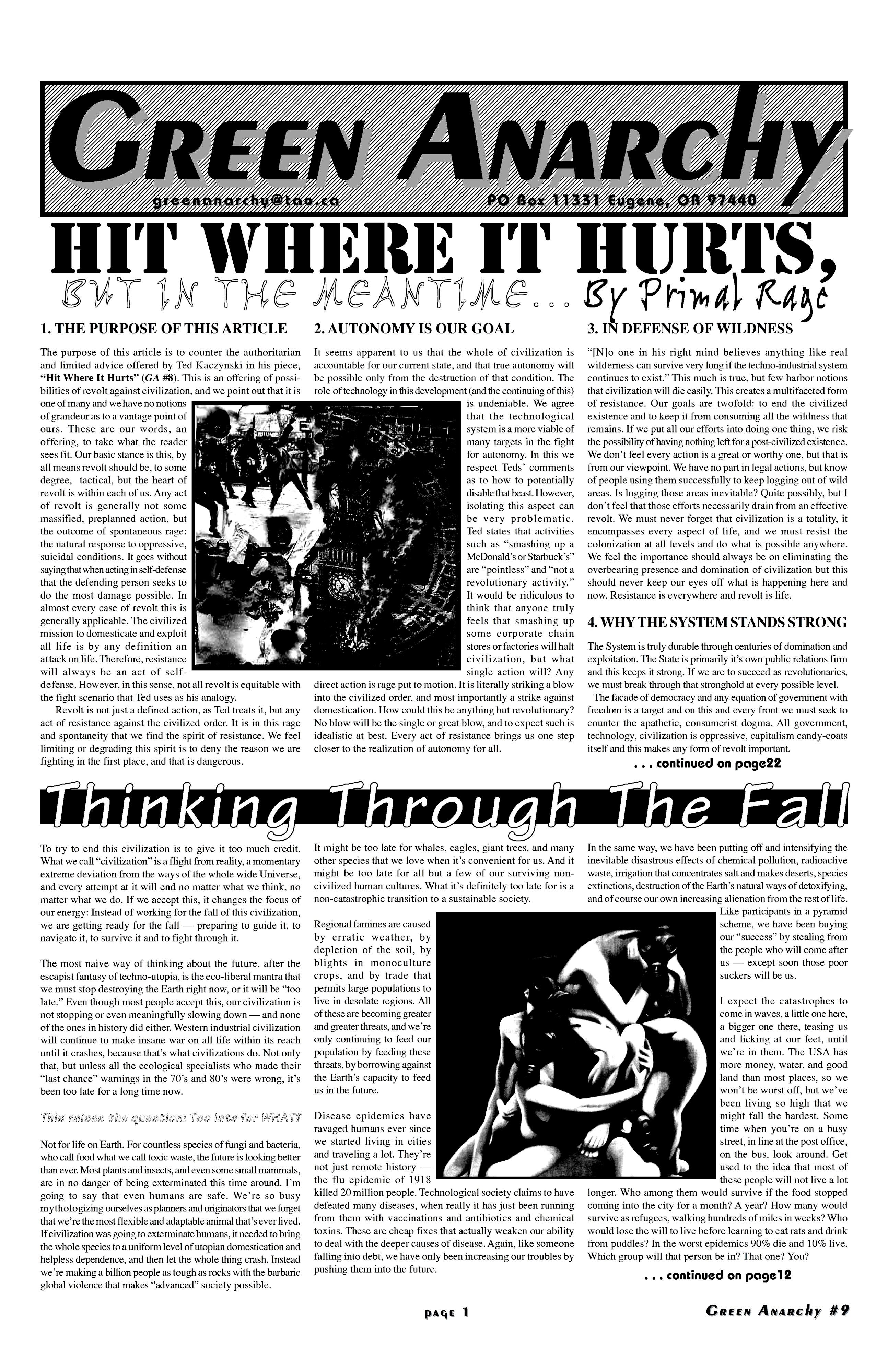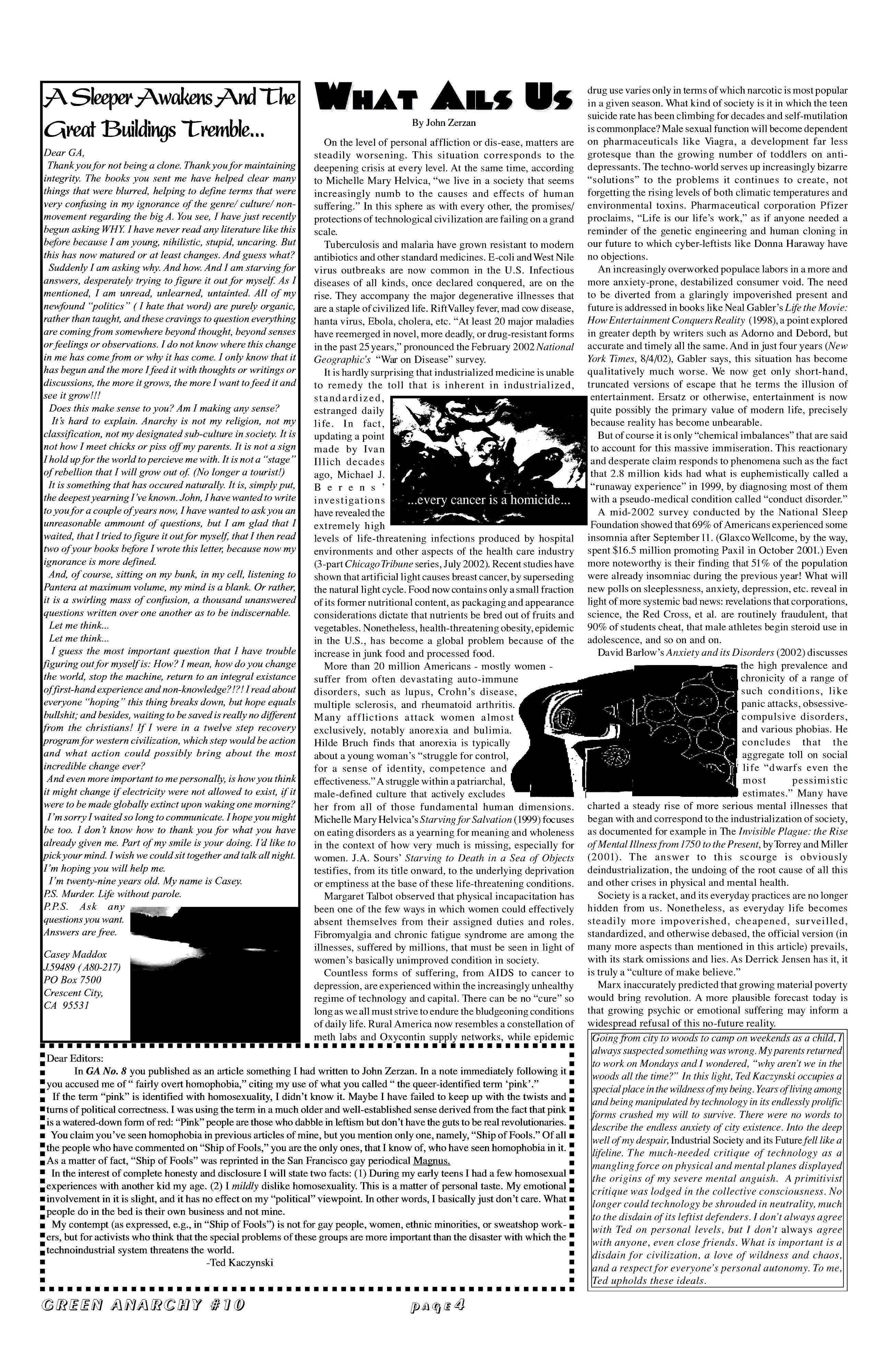Green Anarchy Issue 9: <archive.org/details/GreenAnarchy9>
Green Anarchy Issue 10: <archive.org/details/GreenAnarchy10>
Ted Kaczynski
Hit where it hurts
1. The Purpose Of This Article.
3. The Timber Industry Is A Side Issue.
5. It Is Useless To Attack The System In Terms Of Its Own Values.
6. Radicals Must Attack The System At The Decisive Points.
7. Biotechnology May Be The Best Target For Political Attack.
8. All Biotechnology Must Be Attacked As A Matter Of Principle.
9. Radicals Are Not Yet Attacking Biotech Effectively.
Place The Blame Where It Belongs
Hit Where It Hurts, but in the Meantime...
1. The Purpose of This Article
4. Why the System Stands Strong
6. Attack With the Brain, Heart and Fist
Hit where it hurts
1. The Purpose Of This Article.
The purpose of this article is to point out a very simple principle of human conflict, a principle that opponents of the techno-industrial system seem to be overlooking. The principle is that in any form of conflict, if you want to win, you must hit your adversary where it hurts.
I have to explain that when I talk about “hitting where it hurts” I am not necessarily referring to physical blows or to any other form of physical violence. For example, in oral debate, “hitting where it hurts” would mean making the arguments to which your opponents position is most vulnerable. In a presidential election, “hitting where it hurts” would mean winning from your opponent the states that have the most electoral votes. Still, in discussing this principle I will use the analogy of physical combat, because it is vivid and clear.
If a man punches you, you can’t defend yourself by hitting back at his fist, because you can’t hurt the man that way. In order to win the fight, you have to hit him where it hurts. That means you have to go behind the fist and hit the sensitive and vulnerable parts of the man’s body.
Suppose a bulldozer belonging to a logging company has been tearing up the woods near your home and you want to stop it. It is the blade of the bulldozer that rips the earth and knocks trees over, but it would be a waste of time to take a sledgehammer to the blade. if you spent a long, hard day working on the blade with the sledge, you might succeed in damaging it enough so that it became useless. But, in comparison with the rest of the bulldozer, the blade is relatively inexpensive and easy to replace. The blade is only the “fist” with which the bulldozer hits the earth. To defeat the machine you must go behind the “fist” and attack the bulldozers vital parts. The engine, for example, can be ruined with very little expenditure of time and effort by means well known to many radicals.
At this point I must make clear that I am not recommending that anyone should damage a bulldozer (unless it is his own property). Nor should anything in this article be interpreted as recommending illegal activity of any kind. I am a prisoner, and if I were to encourage illegal activity this article would not even be allowed to leave the prison. I use the bulldozer analogy only because it it clear and vivid and will be appreciated by radicals.
2. Technology Is The Target.
It is widely recognized that “the basic variable which determines the contemporary historic process is provided by technological development” (Celso Furtado*). Technology, above all else, is responsible for the current condition of the world and will control its future development. Thus, the “bulldozer” that we have to destroy is modern technology itself. Many radicals are aware of this, and therefore realize that there task is to eliminate the entire techno-industrial system. But unfortunately they have paid little attention to the need to hit the system where it hurts.
Smashing up McDonald’s or Starbuck’s is pointless. Not that I give a damn about McDonald’s or Starbuck’s. I don’t care whether anyone smashes them up or not. But that is not a revolutionary activity. Even if every fast-food chain in the world were wiped out the techno-industrial system would suffer only minimal harm as a result, since it could easily survive without fast-food chains. When you attack McDonald’s or Starbuck’s, you are not hitting where it hurts.
Some months ago I received a letter from a young man in Denmark who believed that the techno-industrial system had to be eliminated because, as he put it, “What will happen if we go on this way?” Apparently, however, his form of “revolutionary” activity was raiding fur farms. As a means of weakening the techno-industrial system this activity is utterly useless. Even if animal liberationists succeed in eliminating the fur industry completely they would do no harm at all to the system, because the system can get along perfectly well without furs.
I agree that keeping wild animals in cages is intolerable, and that putting an end to such practices is a noble cause. But there are many other noble causes, such as preventing traffic accidents, providing shelter for the homeless, recycling, or helping old people cross the street. Yet no one is foolish enough to mistake these for revolutionary activities, or to imagine that they do anything to weaken the system.
3. The Timber Industry Is A Side Issue.
To take another example, no one in his right mind believes that anything like real wilderness can survive very long if the techno-industrial system continues to exist. Many environmental radicals agree that this is the case and hope for the collapse of the system. But in practice all they do is attack the timber industry.
I certainly have no objection to their attack on the timber industry. In fact, it’s an issue that is close to my heart and I’m delighted by any successes that radicals may have against the timber industry. In addition, for reasons that I need to explain here, I think that opposition to the timber industry should be one component of the efforts to overthrow the system.
But, by itself, attacking the timber industry is not an effective way of working against the system, for even in the unlikely event that radicals succeeded in stopping all logging everywhere in the world, that would not bring down the system. And it would not permanently save wilderness. Sooner or later the political climate would change and logging would resume. Even if logging never resumed, there would be other venues through which wilderness would be destroyed, or if not destroyed then tamed and domesticated. Mining and mineral exploration, acid rain, climate changes, and species extinction destroy wilderness; wilderness is tamed and domesticated through recreation, scientific study, and resource management, including among other things electronic tracking of animals, stocking of streams with hatchery-bred fish, and planting of genetically-engineered trees.
Wilderness can be saved permanently only by eliminating the techno-industrial system, and you cannot eliminate the system by attacking the timber industry. The system would easily survive the death of the timber industry because wood products, though very useful to the system, can if necessary be replaced with other materials.
Consequently, when you attack the timber industry, you are not hitting the system where it hurts. The timber industry is only the “fist” (or one of the fists) with which the system destroys wilderness, and, just as in a fist-fight, you can’t win by hitting at the fist. You have to go behind the fist and strike at the most sensitive and vital organs of the system. By legal means, of course, such as peaceful protests.
4. Why The System Is Tough.
The techno-industrial system is exceptionally tough due to its so-called “democratic” structure and its resulting flexibility. Because dictatorial systems tend to be rigid, social tensions and resistance can be built up in them to the point where they damage and weaken the system and may lead to revolution. But in a “democratic” system, when social tension and resistance build up dangerously the system backs off enough, it compromises enough, to bring the tensions down to a safe level.
During the 1960s people first became aware that environmental pollution was a serious problem, the more so because the visible and smellable filth in the air over our major cities was beginning to make people physically uncomfortable. Enough protest arose so that an Environmental Protection Agency was established and other measures were taken to alleviate the problem. Of course, we all know that our pollution problems are a long, long way from being solved. But enough was done so that public complaints subsided and the pressure on the system was reduced for a number of years.
Thus, attacking the system is like hitting a piece of rubber. A blow with a hammer can shatter cast iron, because caste iron is rigid and brittle. But you can pound a piece of rubber without hurting it because it is flexible: It gives way before protest, just enough so that the protest loses its force and momentum. Then the system bounces back.
So, in order to hit the system where it hurts, you need to select issues on which the system will not back off, in which it will fight to the finish. For what you need is not compromise with the system but a life-and-death struggle.
5. It Is Useless To Attack The System In Terms Of Its Own Values.
It is absolutely essential to attack the system not in terms of its own technologically-oriented values, but in terms of values that are inconsistent with the values of the system. As long as you attack the system in terms of its own values, you do not hit the system where it hurts, and you allow the system to deflate protest by giving way, by backing off.
For example, if you attack the timber industry primarily on the basis that forests are needed to preserve water resources and recreational opportunities, then the system can give ground to defuse protest without compromising its own values: Water resources and recreation are fully consistent with the values of the system, and if the system backs off, if it restricts logging in the name of water resources and recreation, then it only makes a tactical retreat and does not suffer a strategic defeat for its code of values.
If you push victimization issues (such as racism, sexism, homophobia, or poverty) you are not challenging the system’s values and you are not even forcing the system to back off or compromise. You are directly helping the system. All of the wisest proponents of the system recognize that racism, sexism, homophobia, and poverty are harmful to the system, and this is why the system itself works to combat these and similar forms of victimization.
“Sweatshops,” with their low pay and wretched working conditions, may bring profit to certain corporations, but wise proponents of the system know very well that the system as a whole functions better when workers are treated decently. In making an issue of sweatshops, you are helping the system, not weakening it.
Many radicals fall into the temptation of focusing on non-essential issues like racism, sexism and sweatshops because it is easy. They pick an issue on which the system can afford a compromise and on which they will get support from people like Ralph Nader, Winona La Duke, the labor unions, and all the other pink reformers. Perhaps the system, under pressure, will back off a bit, the activists will see some visible result from their efforts, and they will have the satisfying illusion that they have accomplished something. But in reality they have accomplished nothing at all toward eliminating the techno-industrial system.
The globalization issue is not completely irrelevant to the technology problem. The package of economic and political measures termed “globalization” does promote economic growth and, consequently, technological progress. Still, globalization is an issue of marginal importance and not a well-chosen target of revolutionaries. The system can afford to give ground on the globalization issue. Without giving up globalization as such, the system can take steps to mitigate the negative environmental and economic consequences of globalization so as to defuse protest. At a pinch, the system could even afford to give up globalization altogether. Growth and progress would still continue, only at a slightly lower rate. And when you fight globalization you are not attacking the systems fundamental values. Opposition to globalization is motivated in terms of securing decent wages for workers and protecting the environment, both of which are completely consistent with the values of the system. (The system, for its own survival, can’t afford to let environmental degradation go too far.) Consequently, in fighting globalization you do not hit the system where it really hurts. Your efforts may promote reform, but they are useless for the purpose of overthrowing the techno-industrial system.
6. Radicals Must Attack The System At The Decisive Points.
To work effectively toward the elimination of the techno-industrial system, revolutionaries must attack the system at points at which it cannot afford to give ground. They must attack the vital organs of the system. Of course, when I use the word “attack,” I am not referring to physical attack but only to legal forms of protest and resistance.
Some examples of vital organs of the system are:
-
The electric-power industry. The system is utterly dependent on its electric-power grid.
-
The communications industry. Without rapid communications, as by telephone, radio, television, e-mail, and so forth, the system could not survive.
-
The computer industry. We all know that without computers the system would promptly collapse.
-
The propaganda industry. The propaganda industry includes the entertainment industry, the educational system, journalism, advertising, public relations, and much of politics and of the mental-health industry. The system can’t function unless people are sufficiently docile and conforming and have the attitudes that the system needs them to have. It is the function of the propaganda industry to teach people that kind of thought and behavior.
-
The biotechnology industry. The system is not yet (as far as I know) physically dependent on advanced biotechnology. Nevertheless, the system cannot afford to give way on the biotechnology issue, which is a critically important issue for the system, as I will argue in a moment.
Again: When you attack these vital organs of the system, it is essential not to attack them in terms of the system’s own values but in terms of values inconsistent with those of the system. For example, if you attack the electric-power industry on the basis that it pollutes the environment, the system can defuse protest by developing cleaner methods of generating electricity. If worse came to worse, the system could even switch entirely to wind and solar power. This might do a great deal to reduce environmental damage, but it would not put an end to the techno-industrial system. Nor would it represent a defeat for the system’s fundamental values. To accomplish anything against the system you have to attack all electric-power generation as a matter of principle, on the ground that dependence on electricity makes people dependent on the system. This is a ground incompatible with the system’s values.
7. Biotechnology May Be The Best Target For Political Attack.
Probably the most promising target for political attack is the biotechnology industry. Though revolutions are generally carried out by minorities, it is very useful to have some degree of support, sympathy, or at least acquiescence from the general population. To get that kind of support or acquiescence is one of the goals of political action. If you concentrated your political attack on, for example, the electric-power industry, it would be extremely difficult to get any support outside of a radical minority, because most people resist change to their way of living, especially any change that inconveniences them. For this reason, few would be willing to give up electricity.
But people do not yet feel themselves dependent on advanced biotechnology as they do on electricity. Eliminating biotechnology will not radically change their lives. On the contrary, it would be possible to show people that the continued development of biotechnology will transform their way of life and wipe out age-old human values. Thus, in challenging biotechnology, radicals should be able to mobilize in their own favor the natural human resistance to change.
And biotechnology is an issue on which the system cannot afford to lose. It is an issue on which the system will have to fight to the finish, which is exactly what we need. But — to repeat once more — it is essential to attack biotechnology not in terms of the system’s own values but in terms of values inconsistent with those of the system. For example, if you attack biotechnology, primarily on the basis that it may damage the environment, or that genetically-modified foods may be harmful to health, then the system can and will cushion your attack by giving ground or compromising — for instance, by introducing increased supervision of genetic research and more rigorous testing and regulation of genetically-modified crops. People’s anxiety will then subside and protest will wither.
8. All Biotechnology Must Be Attacked As A Matter Of Principle.
So, instead of protesting one or another negative consequence of biotechnology, you have to attack all modern biotechnology on principle, on grounds such as (a) that it is an insult to all living things; (b) that it puts too much power in the hands of the system; (c) that it will radically transform fundamental human values that have existed for thousands of years; and similar grounds that are inconsistent with the values of the system.
In response to this kind of attack the system will have to stand and fight. It cannot afford to cushion your attack by backing off to any great extent, because biotechnology is too central to the whole enterprise of technological progress, and because in backing off the system would not be making only a tactical retreat, but would be taking a major strategic defeat to its code of values. Those values would be undermined and the door would be opened to further political attacks that would hack away at the foundations of the system.
Now it’s true that the U.S. House of Representatives recently voted to ban cloning of human beings, and at least some congressmen even gave the right kinds of reasons for doing so. The reasons I read about were framed in religious terms, but whatever you may think of the religious terms involved, these reasons were not technologically acceptable reasons. And that is what counts.
Thus, the congressmen’s vote on human cloning was a genuine defeat for the system. But it was only a very, very small defeat, because of the narrow scope of the ban — only one tiny part of biotechnology was affected — and because for the near future cloning of human beings would be of little practical use to the system anyway. But the House of Representatives’ action does suggest that this may be a point at which the system is vulnerable, and that a broader attack on all of biotechnology might inflict severe damage on the system and its values.
9. Radicals Are Not Yet Attacking Biotech Effectively.
Some radicals do attack the biotechnology, whether politically or physically, but as far as I know they explain their opposition to biotech in terms of the system’s own values. That is, their main complaints are the risks of environmental damage and of harm to health.
And they are not hitting the biotech industry where it hurts. To use an analogy of physical combat once again, suppose you had to defend yourself against a giant octopus. You would not be able to fight back effectively by hacking at the tips of its tentacles. You have to strike at its head. From what I’ve read of their activities, radicals who work against biotechnology still do no more than hack at the tips of the octopus’s tentacles. They try to persuade ordinary farmers, individually, to refrain from planting genetically-engineered seed. But there are many thousands of farms in America, so that persuading farmers individually is an extremely inefficient way to combat genetic engineering. It would be much more effective to persuade research scientists engaged in biotechnological work, or executives of companies like Monsanto, to leave the biotech industry. Good research scientists are people who have special talents and extensive training, so they are difficult to replace. The same is true of top corporate executives. Persuading just a few of these people to get out of biotech would do more damage to the biotechnology industry than persuading a thousand farmers not to plant genetically-engineered seed.
10. Hit Where It Hurts.
It is open to argument whether I am right in thinking that biotechnology is the best issue on which to attack the system politically. But it is beyond argument that radicals today are wasting much of their energy on issues that have little or no relevance to the survival of the technological system. And even when they do address the right issues, radicals do not hit where it hurts. So instead of trotting off to the next world trade summit to have temper tantrums over globalization, radicals ought to put in some time thinking how to hit the system where it really hurts. By legal means, of course.
Responses
Place The Blame Where It Belongs
The GA Collective Respond To “Hit Where It Hurts”
Although the Green Anarchy editorial collective whole-heartedly supports Ted Kaczynski as an anarchist political prisoner, we had serious reservations about running this article due to Ted’s hostility towards feminism and his casual, off-hand dismisall of other liberation struggles which he chooses not to prioritize in his own life. Racism, sexism, homophobia and poverty are not “non-essential issues” to us, as they appear to be to Ted; compulsary heterosexuality, socially-enforced sexual conformity, racism, mysogyny, and class division are all products of a hierarchical, patriarchal power structure, and none of these problems can ever be fully solved within the context of civilization. It’s not“technology, above all else, which is responsible for the current condition of the world”, as Ted claims — it’s civilization / patriarchy — and if we want to dismantle the technological megamachine that is now devouring the biosphere, then we need to understand how the megamachine came to be, what led to it’s creation, and how it serves the interests of civilization’s rulers. We ultimately decided to print this article because Ted is a sharp strategic thinker, and because we feel strongly that more discussions like this need to be occuring in the pages of the anarchist press.At the same time, we feel compelled to say that Ted’s analysis of patriarchy and civilization is severely lacking, and we take offence to his disparaging use of the queer-identified term “pink,” which is reminiscent of the fairly overt homophobia we have seen in previous pieces by Ted, like Ship Of Fools. Simply and solely removing technology as the total liberatory answer is a limited and mechanistic approach. We face a totality of domination which oppresses all life and we need to try to see the whole picture. For anti-authoritarian transformation, many struggles are necessary and need to be respected along with an awareness of the underlying connectedness.
Of course, there can be no doubt that technology is a major link on the chain of our oppression and it’s important that anarchists / anti-authoritarians purge themselves of the liberal belief that technology is “neutral.” There are five books that we can reccomend to our readers that will help get them started on the process of deconstructing their faith in and allegiance to technology. They are: The Technological Society by Jacques Ellul (out-of-print, but readilly available in any good used bookstore), Technics and Human Development: The Myth Of The Machine Volume 1 by Lewis Mumford, Technics and Civilization by Lewis Mumford, My Name Is Chellis & I’m In Recovery From Civilization by Chellis Glendinng, and Four Arguments For The Elimination Of Television by Jerry Mander, which focuses on the destructive impact of a very specific technology but which also offers an incredibly strong critique of technological mediation — which has a much wider applicability.
Hit Where It Hurts, but in the Meantime...
By Primal Rage
1. The Purpose of This Article
The purpose of this article is to counter the authoritarian and limited advice offered by Ted Kaczynski in his piece, “Hit Where It Hurts” (GA #8). This is an offering of possibilities of revolt against civilization, and we point out that it is one of many and we have no notions of grandeur as to a vantage point of ours. These are our words, an offering, to take what the reader sees fit. Our basic stance is this, by all means revolt should be, to some degree, tactical, but the heart of revolt is within each of us. Any act of revolt is generally not some massified, preplanned action, but the outcome of spontaneous rage: the natural response to oppressive, suicidal conditions. It goes without saying that when acting in self-defense that the defending person seeks to do the most damage possible. In almost every case of revolt this is generally applicable. The civilized mission to domesticate and exploit all life is by any definition an attack on life. Therefore, resistance will always be an act of self-defense. However, in this sense, not all revolt is equitable with the fight scenario that Ted uses as his analogy.
Revolt is not just a defined action, as Ted treats it, but any act of resistance against the civilized order. It is in this rage and spontaneity that we find the spirit of resistance. We feel limiting or degrading this spirit is to deny the reason we are fighting in the first place, and that is dangerous.
2. Autonomy is Our Goal
It seems apparent to us that the whole of civilization is accountable for our current state, and that true autonomy will be possible only from the destruction of that condition. The role of technology in this development (and the continuing of this) is undeniable. We agree that the technological system is a more viable of many targets in the fight for autonomy. In this we respect Teds’ comments as to how to potentially disable that beast. However, isolating this aspect can be very problematic. Ted states that activities such as “smashing up a McDonald’s or Starbuck’s” are “pointless” and “not a revolutionary activity.” It would be ridiculous to think that anyone truly feels that smashing up some corporate chain stores or factories will halt civilization, but what single action will? Any direct action is rage put to motion. It is literally striking a blow into the civilized order, and most importantly a strike against domestication. How could this be anything but revolutionary? No blow will be the single or great blow, and to expect such is idealistic at best. Every act of resistance brings us one step closer to the realization of autonomy for all.
3. In Defense of Wildness
“[N]o one in his right mind believes anything like real wilderness can survive very long if the techno-industrial system continues to exist.” This much is true, but few harbor notions that civilization will die easily. This creates a multifaceted form of resistance. Our goals are twofold: to end the civilized existence and to keep it from consuming all the wildness that remains. If we put all our efforts into doing one thing, we risk the possibility of having nothing left for a post-civilized existence.
We don’t feel every action is a great or worthy one, but that is from our viewpoint. We have no part in legal actions, but know of people using them successfully to keep logging out of wild areas. Is logging those areas inevitable? Quite possibly, but I don’t feel that those efforts necessarily drain from an effective revolt. We must never forget that civilization is a totality, it encompasses every aspect of life, and we must resist the colonization at all levels and do what is possible anywhere. We feel the importance should always be on eliminating the overbearing presence and domination of civilization but this should never keep our eyes off what is happening here and now. Resistance is everywhere and revolt is life.
4. Why the System Stands Strong
The System is truly durable through centuries of domination and exploitation. The State is primarily its own public relations firm and this keeps it strong. If we are to succeed as revolutionaries, we must break through that stronghold at every possible level.
The facade of democracy and any equation of government with freedom is a target and on this and every front we must seek to counter the apathetic, consumerist dogma. All government, technology, civilization is oppressive, capitalism candy-coats itself and this makes any form of revolt important.
5. No Rage is Alike
Ted’s treatment of “victimization issues” is a topic in itself, and so we’ll only give it brief attention here. The favoritism in this society towards white males needs little background, but the outcome of that will usually be apparent. Those of us who come from such a position need to recognize the reality that the people Ted calls “victims” have their own source of rage. We should realize how that rage fits into the problem of civilization and embrace that revolt. This isn’t to say, “don’t be critical”, in fact we feel the exact opposite. We all have our own source of rage and contempt for civilization. This gives us the true beauty and power of revolt, and we should embrace that and take and give to it. Anyone who tries to determine whom someone should and shouldn’t oppose is hardly fighting alongside that person (not that that should even necessarily be the case, but another point is to just be upfront about where you stand). Authoritarianism and elitism should be understood as tools of civilization, it is up to all of us to overcome this in our own ways.
6. Attack With the Brain, Heart and Fist
We stand by the five targets that Ted points out in his sixth section. We feel that the only real danger here is the simplicity and ease with which he suggests that these be targeted. The way in which Ted implies getting rid of these organs makes it sound like we should all be effective anti-tech warriors. This is just a pipedream, and anyone could tell you that the elves who pull off hits like Vail didn’t just decide out of the blue one day to go burn it down. The most impacting of hits are going to be the biggest and in any case the maxim of maximum destruction, not minimal damage should be the principle. However, it really isn’t smart to go out and try and burn down some huge building.
Like anything, eco-sabotage is a skill. It takes practice and confidence to pull off something really big, and it takes time to get there. Those little spontaneous actions, such as smashing some windows, gluing some locks, or even confronting people openly are stepping stones to something bigger. While this isn’t any sole reason to embrace those, it’s definitely a positive one.
To suggest jumping into a big action is a dangerous suggestion. It is important to follow your heart, but most important to trust your instincts. If you think something horrible may happen, by all means you should seriously weigh the possible outcomes or try again later. The costs of getting busted doing something without practice are way too high to chance. Practice makes perfect and every bit counts.
7. Give It All You Got
The points on biotech we will leave alone, since we agree in their importance as targets (although it’s debatable that something can really blanket over everything else as THE most important of targets). We hope that resistance will continually rise, and that seems to be the most likely case as the State tightens the leash and automation makes our lives all the more meaningless. Our basic point here is that any act of revolt is a positive thing. While each may seem insignificant and even some may not have been the best decisions, those aren’t grounds for not giving solidarity to those actions. We must realize that we are not fighting for some obscure academic principle, but for the sake of wild life itself. More is weighing on this than any language could possibly attempt to sum up. We feel that a major point that Ted seems to have overlooked in this instance is that the success of FC didn’t come from the elimination of the technological industrial system, but by helping push the seriousness of it to another level. In the long run, offing a few representatives of technological progression and the more common occurrence of improperly made bombs or targeting may not have the impact that the ensuing text and attention did. This is something that we all need to learn from, that every little bit counts. While we should be looking tactically for a way to get rid of this whole mess of a system, we should do every bit possible to strike against it in everyday life.
Ted’s Response to the Responses
Dear Editors:
In GA No. 8 you published as an article something I had written to John Zerzan. In a note immediately following it you accused me of “fairly overt homophobia,” citing my use of what you called “the queer-identified term ‘pink’.”
If the term “pink” is identified with homosexuality, I didn’t know it. Maybe I have failed to keep up with the twists and turns of political correctness. I was using the term in a much older and well-established sense derived from the fact that pink is a watered-down form of red: “Pink” people are those who dabble in leftism but don’t have the guts to be real revolutionaries.
You claim you’ve seen homophobia in previous articles of mine, but you mention only one, namely, “Ship of Fools.” Of all the people who have commented on “Ship of Fools,” you are the only ones, that I know of, who have seen homophobia in it. As a matter of fact, “Ship of Fools” was reprinted in the San Francisco gay periodical Magnus.
In the interest of complete honesty and disclosure I will state two facts: (1) During my early teens I had a few homosexual experiences with another kid my age. (2) I mildly dislike homosexuality. This is a matter of personal taste. My emotional involvement in it is slight, and it has no effect on my “political” viewpoint. In other words, I basically just don’t care. What people do in the bed is their own business and not mine.
My contempt (as expressed, e.g., in “Ship of Fools”) is not for gay people, women, ethnic minorities, or sweatshop workers, but for activists who think that the special problems of these groups are more important than the disaster with which the technoindustrial system threatens the world.
—Ted Kaczynski
Sources
Green Anarchy Issue 8: <archive.org/details/GreenAnarchy8>
Green Anarchy Issue 9: <archive.org/details/GreenAnarchy9>
Green Anarchy Issue 10: <archive.org/details/GreenAnarchy10>










